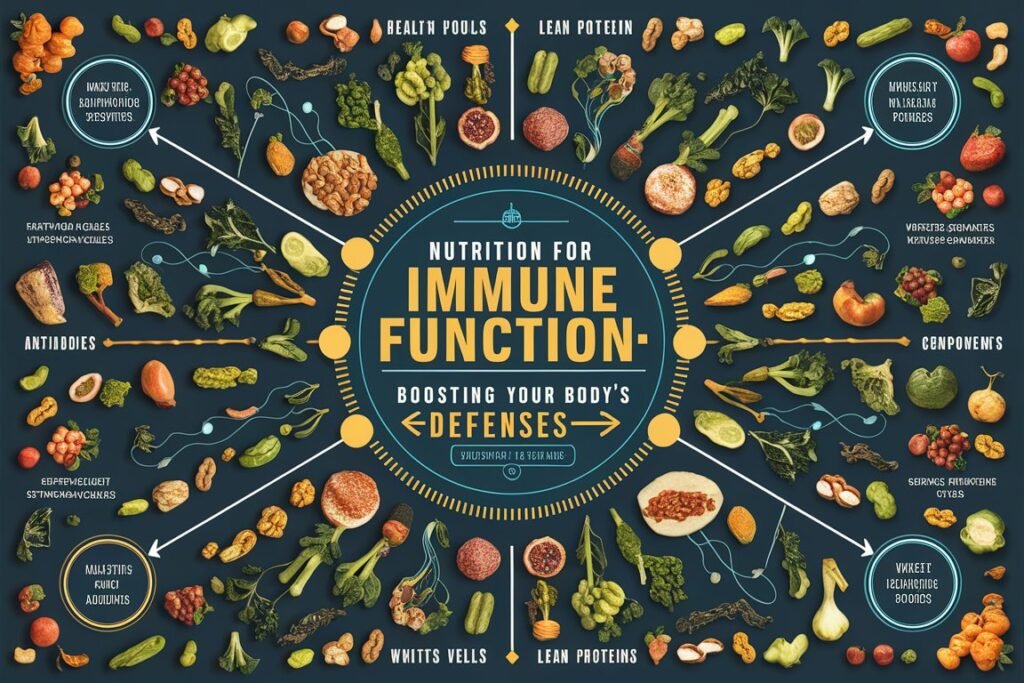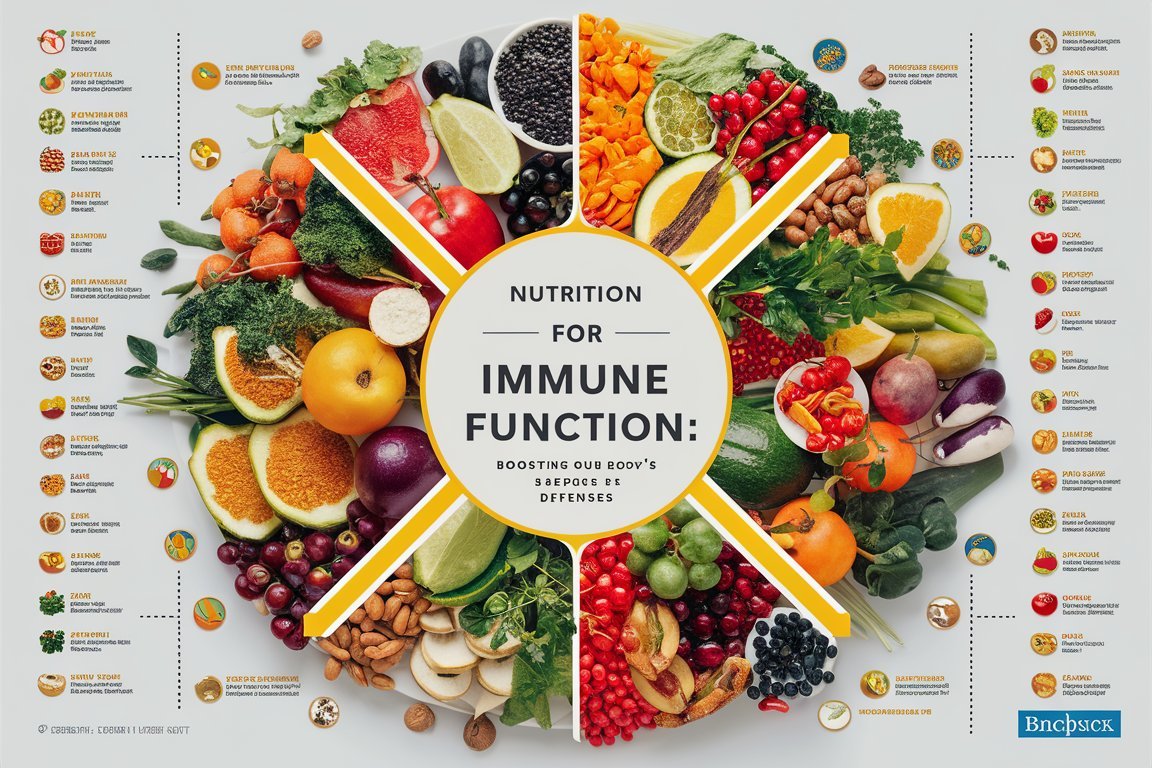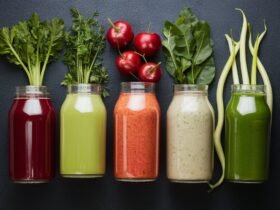Nutrition for Immune Function: Boosting Your Body’s Defenses
Hey there, my young and amazing friends of 2024! It’s your favorite nutrition superhero, Nita Sharda, here to take you on an exciting adventure into the world of immune health. Now, I know what you might be thinking – “Immune health? That sounds like something only doctors and scientists care about!” But trust me, understanding how to keep our immune systems strong and healthy is important for everyone, no matter what age we are.
Today, we’re going to put on our superhero capes and discover how the foods we eat can help us build a powerful defense system against all kinds of germs and bugs. But before we dive in, let me make one thing clear – this is not about putting anyone on a strict diet or making them feel bad about what they eat. It’s simply about empowering you with the knowledge and tools to make food choices that support your immune health, now and in the future.
So, are you ready to join me on this immune-boosting adventure? Let’s go!
What is the Immune System?
First things first, let’s talk about what the immune system actually is. Think of your immune system like a team of tiny superheroes inside your body, working around the clock to keep you healthy and strong. These superheroes are called white blood cells, and they’re always on the lookout for anything that doesn’t belong in your body, like germs, viruses, and other invaders.
When your immune system spots an invader, it springs into action, sending out special cells and chemicals to fight off the threat. It’s kind of like a big game of tag, with your immune cells chasing down and tagging the bad guys so they can’t make you sick.
Your immune system is amazing, but it’s not perfect. Sometimes, invaders can slip past your defenses and make you feel under the weather. That’s why it’s so important to do everything we can to support our immune systems and keep them in tip-top shape.
The Link Between Nutrition and Immune Health

So, how does nutrition fit into the immune health picture? Well, just like any team of superheroes, your immune cells need the right fuel to do their jobs. The foods you eat provide the building blocks your body needs to create strong, healthy immune cells and keep them functioning at their best.
Think of it like this – if you were building a superhero team, you’d want to make sure they had all the tools and resources they needed to fight crime and save the day, right? You wouldn’t send them out with faulty gadgets or an empty utility belt. The same is true for your immune system – if you don’t give it the right nutrients, it won’t be able to do its job as effectively.
Key Nutrients for Immune Health
So, what are the key nutrients our immune systems need to stay strong and healthy? Here are a few of the most important ones:
1. Vitamin C
Vitamin C is like the ultimate immune-boosting superhero. It helps your body create more white blood cells, which are the frontline defenders against invading germs and viruses. Vitamin C also helps your body absorb iron, which is important for immune function.
You can find vitamin C in all kinds of delicious foods, like:
- Citrus fruits (oranges, grapefruits, lemons, limes)
- Berries (strawberries, raspberries, blueberries)
- Kiwi fruit
- Bell peppers (especially red and yellow ones)
- Broccoli
- Brussels sprouts
2. Vitamin D
Vitamin D is another immune-boosting powerhouse. It helps regulate your immune system and may even help protect against respiratory infections like the common cold.
Your body can make vitamin D when your skin is exposed to sunlight, but it can be tough to get enough vitamin D from the sun alone, especially if you live in a place with long, dark winters. That’s where food comes in! You can find vitamin D in:
- Fatty fish (salmon, tuna, mackerel)
- Egg yolks
- Fortified dairy products (milk, yogurt, cheese)
- Fortified cereals and juices
3. Zinc
Zinc is like the ultimate wingman for your immune system. It helps your body create and activate special immune cells called T-cells, which seek out and destroy invading viruses and bacteria.
You can find zinc in:
- Lean meats (beef, pork, chicken)
- Seafood (oysters, crab, lobster)
- Beans and legumes (chickpeas, lentils, black beans)
- Nuts and seeds (pumpkin seeds, cashews, almonds)
- Whole grains (quinoa, oats, brown rice)
4. Probiotics
Probiotics are like the friendly neighborhood superheroes of your gut. They’re beneficial bacteria that live in your digestive tract and help keep your immune system in balance.
You can find probiotics in fermented foods like:
- Yogurt and kefir
- Sauerkraut
- Kimchi
- Miso
- Tempeh
- Kombucha
Putting It All Together: An Immune-Boosting Meal Plan
Now that we know some of the key nutrients for immune health, let’s talk about how to put them all together into a delicious and nutritious meal plan. Here’s an example of what a day of eating for a strong immune system might look like:
Breakfast:
- Yogurt parfait with layers of plain Greek yogurt, berries, and granola
- Scrambled eggs with spinach and bell peppers
- Glass of orange juice
Snack:
- Handful of pumpkin seeds and dried apricots
- Carrot sticks with hummus
Lunch:
- Turkey and avocado sandwich on whole grain bread with lettuce and tomato
- Side salad with mixed greens, cherry tomatoes, and a sprinkle of sunflower seeds
- Glass of low-fat milk
Snack:
- Smoothie made with low-fat yogurt, frozen berries, and a handful of spinach
- Hard-boiled egg
Dinner:
- Grilled salmon with roasted broccoli and sweet potato wedges
- Quinoa salad with chickpeas, red bell pepper, and a lemon-olive oil dressing
- Glass of fortified soy milk
Snack:
- Plain yogurt with a drizzle of honey and a sprinkle of chia seeds
Remember, this is just an example – the specific foods you choose may vary based on your preferences and what’s available to you. The key is to focus on including a variety of nutrient-dense foods that provide the building blocks for a strong immune system.
Other Lifestyle Factors That Support Immune Health
While nutrition is a key factor in immune health, there are other lifestyle factors that can also play a role. Here are a few things to keep in mind:
1. Get Enough Sleep
Sleep is like a secret weapon for your immune system. When you’re snoozing, your body is hard at work repairing and regenerating cells, including immune cells. Aim for 9-11 hours of sleep per night for kids and 8-10 hours per night for teens.
2. Manage Stress
Stress can be tough on your immune system, making it harder for your body to fight off invaders. While some stress is normal and even healthy, chronic stress can take a toll on your health over time.
Try to find healthy ways to manage stress, like:
- Talking to a trusted friend or family member
- Practicing deep breathing or meditation
- Engaging in physical activity you enjoy
- Doing something creative, like drawing or writing
3. Stay Active
Regular physical activity is like a natural immune booster. It helps increase circulation, which allows immune cells to travel more easily throughout your body. It also helps reduce stress and improve sleep, both of which are important for immune health.
Aim for at least 60 minutes of moderate to vigorous physical activity most days of the week. This can include things like:
- Playing sports
- Going for a bike ride or hike
- Dancing
- Doing yoga or stretching exercises
4. Practice Good Hygiene
One of the best ways to support your immune system is to practice good hygiene habits that help prevent the spread of germs. This includes:
- Washing your hands regularly with soap and water, especially before eating and after using the bathroom
- Covering your mouth and nose with a tissue or your elbow when you cough or sneeze
- Avoiding close contact with people who are sick
- Staying home when you’re not feeling well to avoid spreading germs to others
The Bottom Line
Wow, we covered a lot of ground today! But I hope this gives you a better understanding of how the foods we eat and the lifestyle choices we make can support a strong and healthy immune system.













Leave a Reply